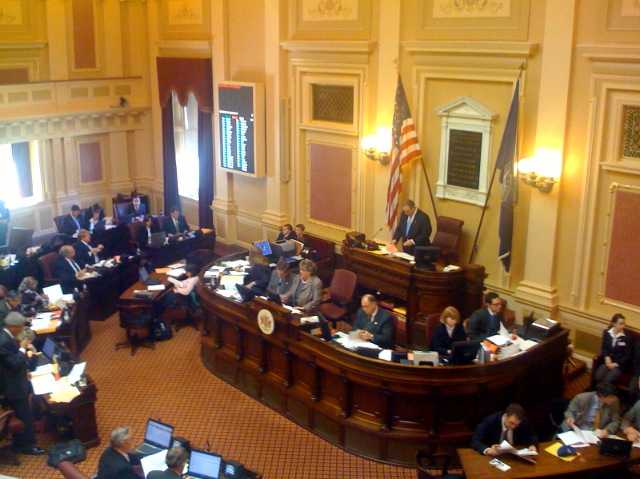Virginia Senate Votes to Repeal Laws Prohibiting Same-Sex ‘Marriage,’ Civil Unions in State

RICHMOND, Va. — The Virginia Senate voted on Tuesday to repeal two state laws prohibiting same-sex “marriage” and civil unions. The votes were mostly along party lines, but with five Republicans voting in favor of the proposal.
“Right now, same-gender marriage is legal in Virginia as it is throughout the country, and the code of Virginia needs to have legal ambiguity removed,” Sen. Adam Ebbin, D-Alexandria, who proposed Senate Bill 17, told reporters. According to NBC12 News, Ebbin is the first openly-homosexual lawmaker in the General Assembly.
“A marriage between persons of the same sex is prohibited,” current law states, though not being enforced due to the 2015 Supreme Court ruling of Obergefell v. Hodges. “Any marriage entered into by persons of the same sex in another state or jurisdiction shall be void in all respects in Virginia and any contractual rights created by such marriage shall be void and unenforceable.”
“A civil union, partnership contract or other arrangement between persons of the same sex purporting to bestow the privileges or obligations of marriage is prohibited,” it also outlines. “Any such civil union, partnership contract or other arrangement entered into by persons of the same sex in another state or jurisdiction shall be void in all respects in Virginia and any contractual rights created thereby shall be void and unenforceable.”
In 2006, 57 percent of voters — 1.3 million casting their ballot — approved the Marshall-Newman Virginia Marriage Amendment, which was proposed to insert language in the state Constitution that would enshrine marriage as being between a man and a woman.
However, in 2014, U.S. District Judge Arenda Wright Allen struck down the amendment, stating that it violated the right to due process and equal protection under the U.S. Constitution.
“The court is compelled to conclude that Virginia’s Marriage Laws unconstitutionally deny Virginia’s gay and lesbian citizens the fundamental freedom to choose to marry,” she wrote.
The Fourth Circuit Court of Appeals upheld Wright Allen’s ruling, opining that “[t]he choice of whether and whom to marry is an intensely personal decision that alters the course of an individual’s life. Denying same-sex couples this choice prohibits them from participating fully in our society, which is precisely the type of segregation that the Fourteenth Amendment cannot countenance.”
The U.S. Supreme Court declined to hear an appeal of the case and went on to approve same-sex nuptials the following year in the aforementioned Obergefell challenge.
According to the Cato Institute, Ebbin subsequently proposed a bill in both 2016 and 2018 to repeal text from Virginia law prohibiting same-sex “marriage,” but the Republican majority blocked it. This year, however, Ebbin’s measure is expected to pass both houses of the Democratic-majority General Assembly and be signed into law by Gov. Ralph Northam.
Tuesday’s vote in the Senate was 25-13, with five Republicans voting in favor: Bill DeSteph, R-Virginia Beach; Siobhan Dunnavent, R-Henrico; Jennifer Kiggans, R-Virginia Beach; David Sutterlein, R-Roanoke; and Jill Vogel R-Fauquier.
Other bills that were advanced this week include Senate Bill 657, which allows those who identify as the opposite sex to have their birth certificate amended, and Senate Bill 245, which prohibits counselors from engaging in “conversion therapy” with youth under 18 who experience unwanted same-sex attraction.
“Any conversion therapy efforts with a person under 18 years of age engaged in by a provider licensed in accordance with the provisions of this subtitle or who performs counseling as part of his training for any profession licensed pursuant to this subtitle shall constitute unprofessional conduct and shall be grounds for disciplinary action by the appropriate health regulatory board within the Department of Health Professions,” the legislation reads.

As previously reported, while a common theme among homosexual advocates is that they were “born this way” and cannot change, the Bible teaches that all men are in the exact same predicament:
All are born with the Adamic sin nature, having various inherent desires, tendencies and inclinations that are contrary to the law of God and being utterly incapable of changing by themselves.
It is why Jesus came: to “save His people from their sins” (Matthew 1:21).
Scripture outlines that Jesus came to be the propitiation for men’s sins (1 John 2:2; 1 John 4:10), a doctrine in Christianity known as substitutionary atonement, and to save men from the wrath of God for their violations against His law (Romans 4:25, Romans 5:9, Romans 5:16), a doctrine known as justification.
Jesus also taught about regeneration, as in addition to sparing guilty men from eternal punishment, He sent his Holy Spirit to make those who would repent and believe in the gospel new creatures in the here and now, with new desires and an ability to do what is pleasing in the sight of God by His indwelling and empowerment.
“Verily, verily, I say unto thee, Except a man be born again, he cannot see the kingdom of God,” Jesus told Nicodemus in John 3:3.
“How can a man be born when he is old? Can he enter the second time into his mother’s womb and be born?” Nicodemus replied.
“Jesus answered, ‘Verily, verily, I say unto thee, Except a man be born of water and of the Spirit, he cannot enter into the kingdom of God. That which is born of the flesh is flesh, and that which is born of the Spirit is spirit. Marvel not that I said unto thee, Ye must be born again.’”
Become a Christian News Network Supporter…







Comments are closed.